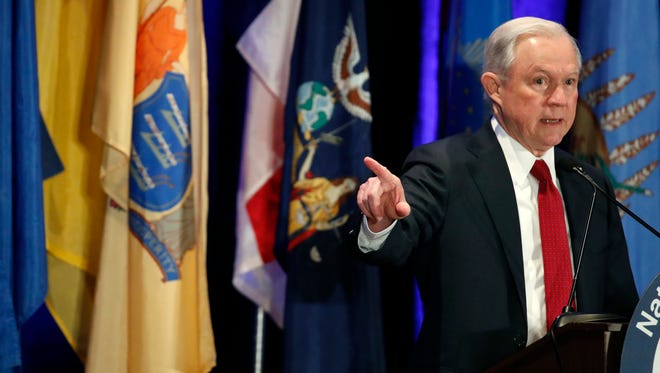Attorney General Jeff Sessions: 'We are in danger' of rising violence

WASHINGTON — Attorney General Jeff Sessions offered a dark view of America's crime problem Tuesday, suggesting that increasing access to heroin and marijuana has put the country at risk of returning to the drug-fueled violence that ravaged the country more than a generation ago.
Despite data showing that murder is at its lowest in decades, Sessions seized on a recent uptick in violent crime and warned state law enforcement officials gathered here that the numbers were "driving this sense that we are in danger.''
"Now, we are at a time, it seems to me, that crime is going back up again,'' Sessions told the National Association of Attorneys General. "Maybe we got a bit overconfident.''
In his first major speech as the nation's chief law enforcement officer, Sessions also signaled that the Justice Department would depart from a frequently used Obama administration practice of suing local police departments to force reforms related to violations of excessive force policies, racial discrimination and other misconduct.
During the Obama administration, more than two dozen local law enforcement agencies — among them Ferguson, Mo., Baltimore and Chicago — were the subjects of federal investigations into misconduct. Those inquiries often resulted in so-called consent decrees in which required reforms to policing operations are overseen by a federal judge. Ferguson and Baltimore police operations are subject to such court oversight, but Sessions has not decided how resolve deep problems uncovered last month by federal investigators in Chicago.
"Somehow, someway, we've undermined respect for police and made — often times — their job more difficult,'' Sessions said. "We need to help police officers get better rather than reduce their effectiveness, and I'm afraid we've done some of that. So, we're going to pull back a little on this. I don't think that it's wrong or mean or insensitive to civil rights or human rights. I think it's out of concern to make the lives of those, especially in poorer communities and minority communities, live a safer, happier life.''
Sessions said earlier this week that tensions between police and the communities they patrol, particularly in Chicago, have likely resulted in a pull back on basic policing activities and may be a factor in driving violent crime up.
Read more:
Exclusive: Feds threatening to shut down marijuana festival, Cannabis Cup, in Las Vegas
Attorney General Jeff Sessions vows new violent crime fight
Cannabis industry roiled by White House comments on enforcement
Sessions, a former federal prosecutor and Alabama attorney general, said he was most troubled by a spike in violent crime in 2015 and preliminary data from last year that appear to reinforce those concerns.
Both the attorney general and President Trump have repeatedly cited concern for violent crime, despite data which has shown sustained long-term declines.
While murder jumped by 11% in 2015, the biggest one-year increase in more than 40 years, the overall rate remains the lowest in decades. A December analysis of the 2016 overall crime rate in the nation's 30 largest cities by New York University's Brennan Center for Justice found that the rate was expected to remain roughly the same as 2015, indicating that rates "will remain near historic lows.''
Ronal Serpas, chairman of Law Enforcement Leaders to Reduce Crime and Incarceration, said the administration's focus on violent crime appears to be overly clouded by surges in select cities like Chicago and New Orleans.
"The fact is that crime is at 30-year lows,'' said Serpas, who directed police forces in New Orleans, Nashville and Washington state.
But Sessions continued to assert that the 2015 uptick in violence was not "a one-time aberration.''
"I'm afraid it represents the beginning of a trend,'' he said.
The new attorney general said that he had been "shocked'' by the waves of overdose deaths attributed to heroin and its synthetic form fentanyl that continue to cut a particularly deadly swath through the northeast and Midwest.
He also cited the increased legalization of marijuana, an issue he long railed against while an Alabama senator, as contributing to a culture of acceptance.
"I'm not sure we're going to be a better, healthier nation if (marijuana) is being sold from every corner grocery store,'' he said.
"We don't need to be legalizing marijuana, and we need to be cracking down on heroin.''
Illegal immigration, which Sessions and Trump have consistently linked to driving violent crime — another disputed claim — will be another focus for the former lawmaker who has long opposed efforts at immigration reform in the Senate.
"I believe there is nothing wrong — legally, morally or intellectually — with a lawful system of immigration,'' Sessions said. "It serves the national interest ... We're going to make progress. But people who come here unlawfully and commit crimes, they are going to be out of here. The law says they have to be deported.''
The attorney general comments were warmly received in a cavernous downtown meeting room, but California Attorney General Xavier Becerra, a former Democratic congressman, cautioned that the administration's sharp focus on illegal immigration could discourage undocumented residents from cooperating with police as witnesses or victims related to other criminal matters.
"We are finding that some of the actions that the administration is taking, with regard to enforcing immigration laws, is causing a lot of fear,'' Becerra told Sessions during a brief question-and-answer session. "People who are here without documents but who are not committing crimes are beginning to fear approaching law enforcement authorities for fear that they may also be apprehended for trying to be witnesses on crime.''
Sessions acknowledged that federal authorities were "having some disagreements with state and local governments'' over immigration detainers.
"We'll have to wrestle with that,'' the attorney general said. "It's going to be a tough challenge ... We do not need to have a big brawl between our law enforcement agencies. If we can avoid that, I would be pleased.''
